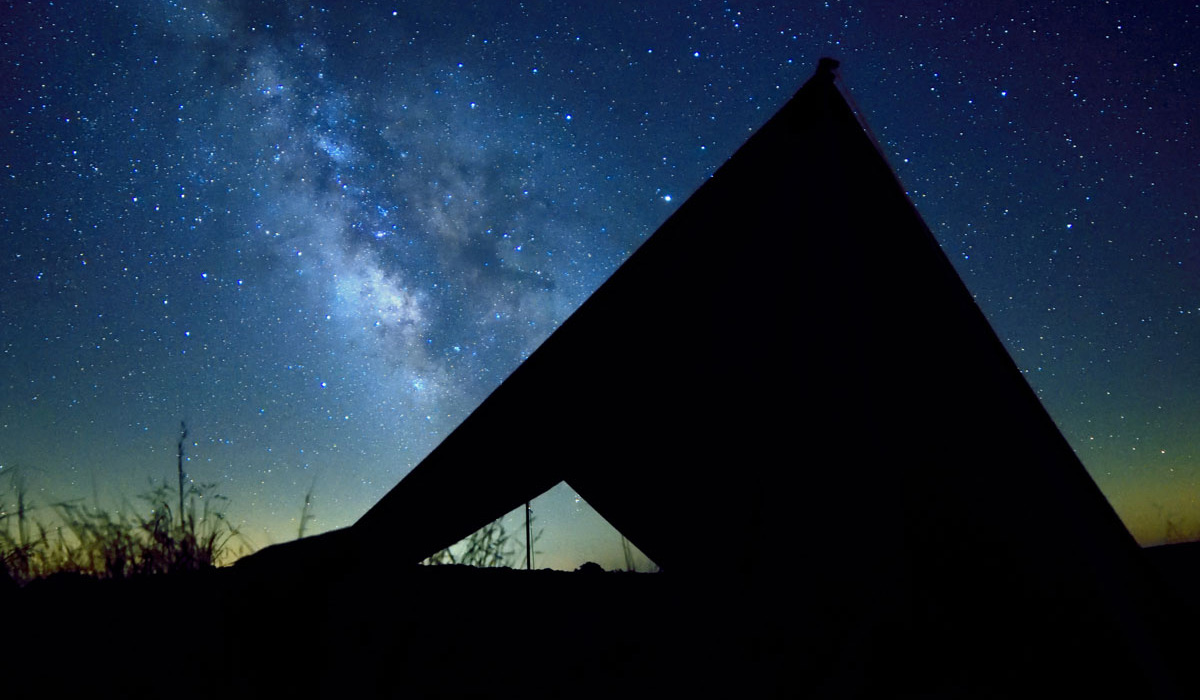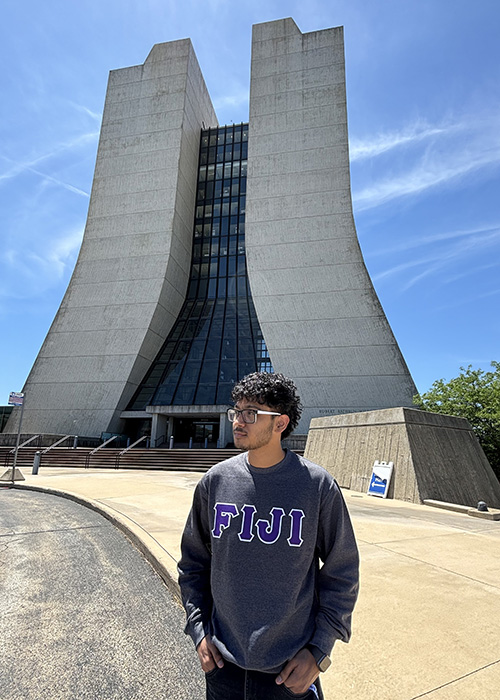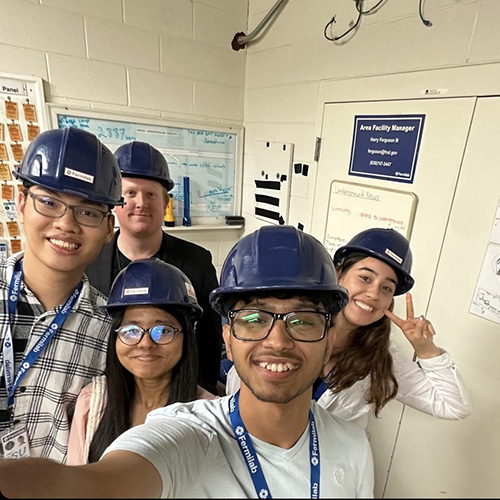
Yaman Acharya ’26 remembers the evenings he spent as a youth gazing at the night sky above his home in Nepal. The cosmic dance of stars in the constellations hundreds of thousands of miles above him invited his imagination to explore the universe’s wonders.
For Acharya, a physics and mathematics double major, a 2024 Summer Internship in Science and Technology (SIST) for the Fermi Research Alliance, LLC, brings him closer to his goal of pursuing a career in astrophysics research.
Exploring energy in the universe
Acharya was always interested in experiential learning—opportunities to apply what he was learning in the classroom to hands-on investigations. He wanted more of these research opportunities to fulfill his passion for studying dark matter and dark energy. Last fall, he spent his Thanksgiving break creating a spreadsheet containing close to two dozen potential internship possibilities. The internship at Fermilab caught his eye.
“I have dreamed of working at Fermilab since I was interested in physics. It’s one of the dream places for every physicist,” he said, recalling his excitement when he received a letter last winter confirming he had received the summer internship.

Through this internship, Acharya investigates the mysteries of cosmic evolution at the Fermi National Accelerator Laboratory (Fermilab), a particle physics and accelerator laboratory in Batavia, Illinois.
His fellow Fermilab interns and postdoctoral research supervisor at Fermilab, Gabriela Marques, work on the world’s most advanced particle accelerators. Together, they study everything from the smallest building blocks of matter in the universe to data gleaned from sky surveys extracted from large telescopes.
At Fermilab, Acharya is using data from the Dark Energy Survey (DES) to work with galaxy density, galaxy weak lensing, and the cross-correlation between galaxy and galaxy weak lensing—referred to as “3x2 points.”
“The latest data from the Dark Energy Spectroscopic Instrument Survey shows that the dark energy content of the universe may be increasing with time,” he explained. “We’re testing the galaxy power spectrum from the increasing dark energy model and seeing how it correlates with the real-time power spectrum obtained from cosmological surveys.”
“The best part about doing astrophysics research is everything you can think of is going on out there. You have to think about every small process that may affect your results.”
– Yaman Acharya ’26
Acharya describes his work as very computational, focused heavily on problem solving.
“I have to write a lot of codes from a lot of scripts, analyze a lot of different files, and use observations from surveys,” he said. “I think it [the experience] will be beneficial for higher level physics courses involving topics such as electromagnetism and quantum physics. The best part about doing astrophysics research is everything you can think of is going on out there. You have to think about every small process that may affect your results."
A Career-Ready Experience in cosmology
Acharya was well-prepared for his Fermilab summer internship thanks to Gettysburg College student research experiences with Physics Prof. Ryan Johnson and the Cross-Disciplinary Science Institute (X-SIG) during the summer of 2023.
“He was very interested in my computational cosmology work,” Johnson said, “and, with my guidance, began a project to simulate a universe in a box, within which we could study the motions of galaxies.”
Acharya also acknowledges the help he received from members of the Gettysburg College community and professors who set him up for success by assisting him with internship applications and writing letters of recommendation. These faculty members include Johnson, Physics Chair Bret Crawford, and Mathematics Chair Keir Lockridge. He also credits the academic rigor of his Gettysburg mathematics and physics courses and his on-campus X-SIG research that helped him develop the computational and critical analysis skills he puts into practice daily during his Fermilab internship.
“The Gettysburg Physics Department prides itself on preparing students like Yaman for research positions just like the one he earned at Fermilab,” Johnson said. “In addition to his academic preparation, beginning his research experience in my lab was critical to Yaman securing this very competitive position.”
In addition to student-faculty research, Acharya benefited from serving as a student assistant at the College’s Hatter Planetarium during his first year at Gettysburg. There, he honed his communication skills by presenting planetarium programs for on- and off-campus groups and developed problem-solving skills by conceptualizing new ideas for programming that incorporate concepts from his studies.

Through the Gettysburg Approach, Acharya recognizes how the breadth and depth of knowledge he is acquiring, as well as the enduring skills he is building at Gettysburg and through his summer internship, contribute to his overall liberal arts and sciences education.
“During my first week working here, I was supposed to use a concept I learned last semester called spherical harmonics to study cosmic microwave background radiation, which is the first light from the universe,” he said. “I said, ‘I know this. I have done this, and I’m going to do more of it in my future quantum courses—and I’m working with this in a real-life scenario. That is awesome.’”
By Michael Vyskocil
Photos provided by Yaman Acharya ’26
Posted: 06/28/24